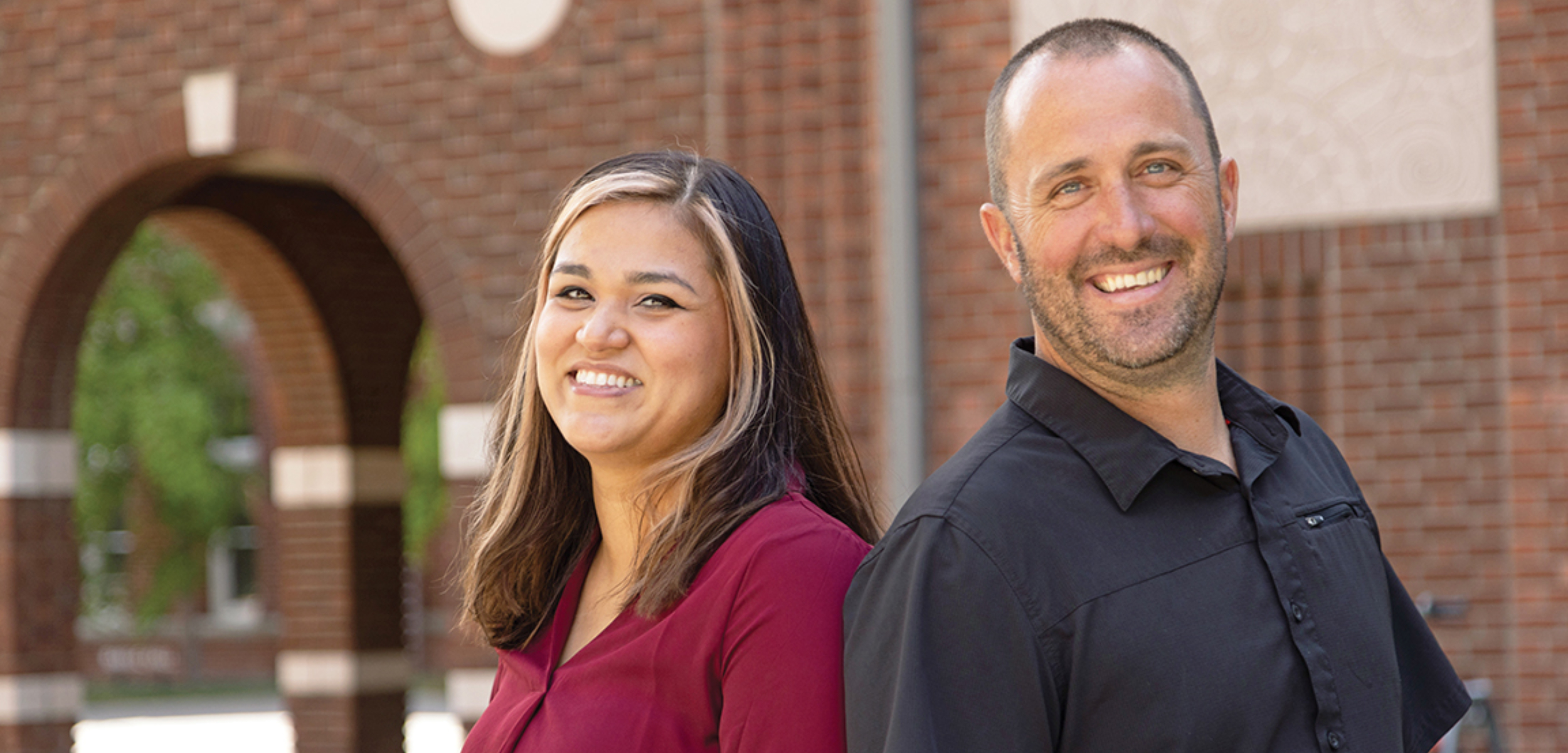
Erika Belmontes knew she needed mentors if she was going to move forward with her career.
The first-generation college student from Quincy had been working nights at a frozen-potato factory while attending community college by day. When she transferred to CWU to study business administration, she started looking for people who could guide her.
Some of her initial classes were with James Avey, a Distinguished Professor of management, and she saw right away that he had many of the qualities she sought in a mentor.
“He was always hilarious, and he just seemed so easy to talk to,” Belmontes said. “I think that’s primarily what I look for in mentors—they’re never going to make you feel bad because you don’t know the answer to a specific question. He really established that safety.”
One day, Belmontes decided to stop by Avey’s office to ask for advice. He was impressed by her ambition.
“She comes in, she’s asking questions, and I’m going, ‘Holy smokes, she’s got wisdom beyond her years. She’s just a standout,’” Avey recalled.
The two quickly identified shared values and established mutual respect. Belmontes had found a mentor.
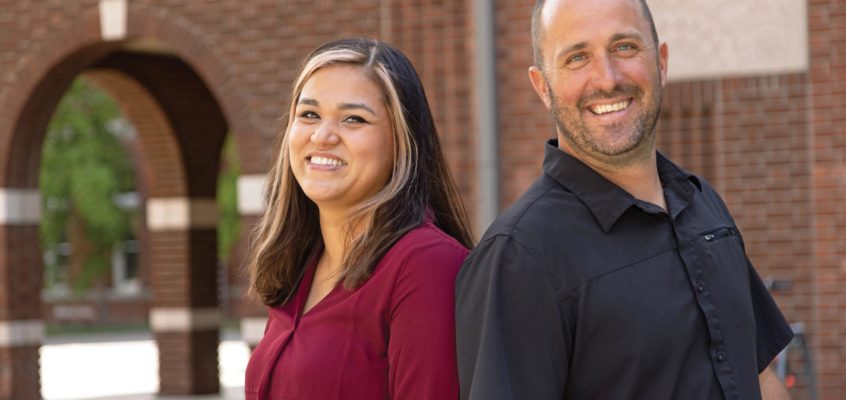
CWU Professor of Management James Avey, right, believes in the power of building relationships with students like Erika Belmontes, left.
After she graduated in 2015 and began her human resources career, Belmontes stayed in touch with Avey. She credits some of her success to that connection, though Avey is quick to put the spotlight back on her. Their relationship illustrates how mentorship often lasts beyond a student’s time at Central, becoming a long-term bond of friendship and trust.
The institution’s emphasis on relationship-building and small class sizes creates an environment where faculty and students are primed to connect, said Kurt Kirstein, interim provost and vice president for academic affairs.
“You’ve got a faculty member who’s dedicated to the field, you’ve got a student who’s curious about the field, and I think that dedication and curiosity feed into each other,” he said.
••••••••
From Student to Professional
Similar relationships are being developed in the CWU Music Department, where students meet weekly for one-on-one lessons with their primary teacher. This creates a unique connection between student and professor from the start, according to Gayla Blaisdell, professor of music, voice, and opera.
“Singing is very personal, because we’re singing with our bodies; our bodies are our instrument,” Blaisdell said. “Almost every lesson starts with a check-in to know how the student is doing, what’s going on with them, so that I know how to teach them during that day.”
When senior McKayla Sherman began her vocal performance studies at Central four years ago, she had heard Blaisdell held herself and her students to a high standard. Sherman started out nervous—unnecessarily memorizing an entire piece of music in the first week—but soon discovered how Blaisdell’s high expectations are designed to help students grow.
“I feel like I can go into my voice lesson and I can tell her about what’s going on in my personal life. It doesn’t even have to be about school, because obviously whatever’s going on in my personal life is affecting the way that I’m performing,” Sherman said. “It’s really helpful to share my thoughts and feelings with her.”
Last spring, Sherman was offered a spot in the summer program at the Saluzzo Opera Academy in Italy. It would be a financial challenge and the first time Sherman would ever leave the United States, but Blaisdell encouraged her to go.
“You’ve got a faculty member who’s dedicated to the field, you’ve got a student who’s curious about the field, and I think that dedication and curiosity feed into each other.”
—Kurt Kirstein, Interim Provost and Vice President for Academic Affairs
Training programs like Saluzzo are key steps toward graduate school and a future as a professional opera singer, Blaisdell said. Helping her singers bridge the gap from student to professional is a critical component of her approach to mentorship.
One notable benefit Blaisdell and her CWU faculty colleagues offer to their students is an experience-based understanding of the industries they come from, Kirstein said. Students appreciate their professors’ authentic knowledge, which builds a pathway toward mentorship.
“We could teach you from a textbook a whole lot of content that’s related to your field,” he said, adding that Central faculty are also committed to helping students become work-ready. “We could teach you to go to the library and look up what others have written about the field. But when you’re dealing with somebody who was an electrical engineer, and is now teaching people how to be electrical engineers, I think there’s just that connection.”
Blaise Dondji, a Distinguished Professor of biological sciences, teaches a course on flow cytometry, a process that quickly analyzes molecules on and around cells. He said cytometry is useful for tasks such as evaluating new vaccines, including the one for COVID-19. Central is one of only a handful of U.S. colleges where undergraduates learn this valuable technique.
“When you finish at Central, you should go and get a job or go to graduate school. If you don’t, then we’ve failed our job at Central to prepare you,” Dondji said. “I tell students, ‘Guess what, I have this cool machine, this cool technique, and all the students that have gone through that training, they get admission to medical school, and they are hotcakes on the job market.’”
Tyanna Stuckey (’22) struggled when she took immunology from Dondji, but he encouraged her to keep going, and she eventually enjoyed the class. The next quarter, she signed up for the flow cytometry course.
“Dr. Dondji has this way of connecting with students and making sure that we know that he cares and that we are successful in his class,” Stuckey said. “I took the flow cytometry class, and that was awesome, just learning new technology.”
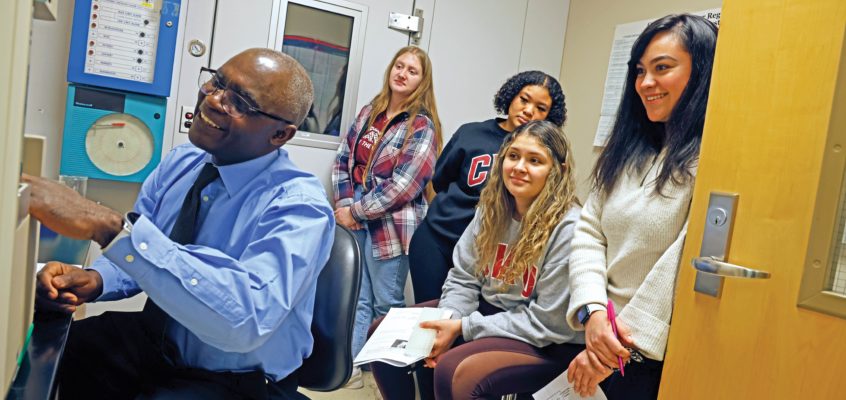
Distinguished Professor of Biological Sciences Blaise Dondji measures his own success as an educator by the success of his students.
Stuckey decided to pursue the discipline as a career. After earning her degree in cell and molecular biology, she was offered a position at the Allen Institute for Immunology in Seattle.
She emailed Dondji to let him know. As is his tradition whenever a former student lands a good job, Dondji had a glass of wine to celebrate.
••••••••
Advising for the Individual
As her human resources career progressed, Belmontes often checked in with Avey, updating him on promotions and job changes, and asking for professional advice. Along the way, they got to know each other better.
In long-lasting mentor-mentee relationships, the human connection becomes more important than the professional one, Avey explained.
“The questions become, ‘Is this a good spot for my family? Is this a good spot for a quality of life? These are some unique scenarios in my family—how does it affect that?’” he said. “Rather than saying, ‘Yes, you’re qualified for this job, here’s what I recommend you negotiate for a signing bonus’ and all that, it becomes a much richer discussion, and then those turn into longer conversations.”
Belmontes’ most recent career change was a big shift: While finishing graduate school at Gonzaga University, she took some time off work to care for her daughter, who will soon start kindergarten. As always, Avey supported Belmontes wholeheartedly.
Avey believes that if faculty members want to become good mentors, they have to show students they care about them as people.
“For us, I think the question is really, ‘do you want to make a difference?’” he said. “And if you do, that comes through relationships. It doesn’t come through PowerPoint slides.”
When Terri Reddout retired from Central in June 2023, a group of her former students at Central News Watch, a student-produced weekly newscast, made a special video to congratulate her, recounting their relationships with fond farewells and inside jokes.
Reddout challenged students to improve as they learned the news business, but her welcoming spirit made Central News Watch even better, said Justin Nuñez (’15), who’s now a supervising producer at CBS 8 in San Diego.
“She was just always an open book,” Nuñez said. “Once a quarter, she would invite us over for a big team dinner, and she’d make an awesome dinner and give us a chance to build camaraderie and get to know her more, just outside of the teacher position, as friends. It’s stayed that way as well.”
When Emily Bontrager (’16), another of Reddout’s former students, decided to leave the news business for a corporate communications position at Intel, she was nervous to tell Reddout—but she didn’t need to be.
“She just said she was proud of me,” Bontrager said. “She really supported anything I did.”
••••••••
From Mentee to Mentor
Students who build deep connections with their mentors often go on to become mentors and leaders themselves.
Reddout keeps up with her Central News Watch alumni through a Facebook group where former students share everything from new jobs to baby announcements. Before she retired, Reddout also used the space to introduce former students to current ones.
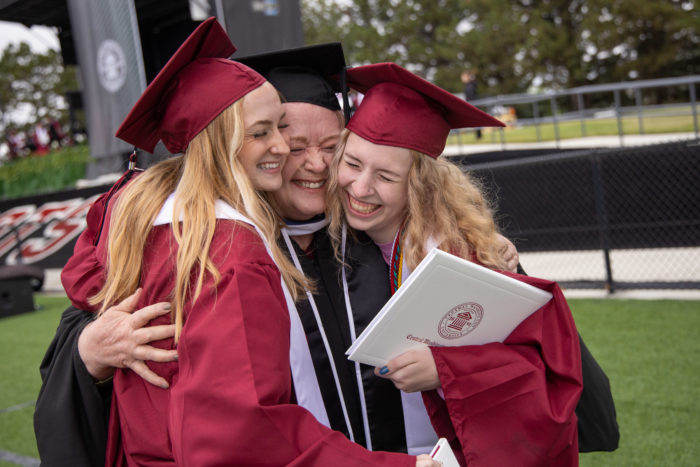
Former Professor of Communication Terri Reddout maintains contact with her students after graduation, and helps them build a network of peers in the industry.
“I would say, ‘Hey, in the producing class, this question came up. How would you handle it?’ And then I would share their answers with my class,” Reddout said. “I’d say, ‘Hey, I need somebody to talk about ethics. Can you be in this Zoom meeting on this day and time?’ And people would show up.”
Nuñez and Bontrager were both regular guests in Reddout’s classes.
“I think that’s my favorite part about Terri: she understands very well that she’s been working in the classroom for years, but the industry outside has changed, and she always puts that effort out to understand and know what’s changing,” Nuñez said. “I love to talk to students, too, because it gives them another perspective, like, ‘I’m working in news still. Everything Terri’s teaching you is going to be the foundation for what you do from here on.’”
Stuckey said Dondji’s outreach work has inspired her to make personal connections a key element of her career development. Dondji is the co-founder of the Bawa Health Initiative, a non-governmental organization in his home country of Cameroon that works to provide health care access and reduce infectious disease in the village of Bawa and the surrounding area.
At the Allen Institute, Stuckey is involved with diversity, equity, inclusion, and belonging efforts, including rebooting her department’s community engagement group after the pandemic.
“My goal with the group is to engage with the community in a culturally relevant way,” she said. “For me, that means engaging with the Black community in a way that allows them to build trust in the research community so that we might do a better job of diversifying our cohorts. This is especially important to me because of my background and the historical distrust of research and governmental entities in the Black community.”
Belmontes has enjoyed getting involved with current students at Central, becoming a mentor herself in the College of Business mentorship program, and speaking at a Society of Human Resource Management event on campus.
Avey credits Belmontes with bringing “boots on the ground” insight to students by sharing her career experiences and challenges, such as building an HR department from scratch and managing labor relations in a unionized manufacturing plant.
But the best part about building a long-term mentorship, Avey says, is that it goes way beyond the practical.
“You don’t really think about it in terms of benefits,” he said. “It’s a joy to give, it’s a joy to support, it’s a joy to connect.”


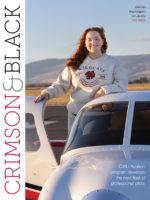


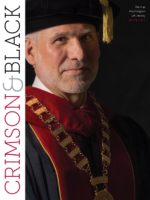
comments powered by Disqus